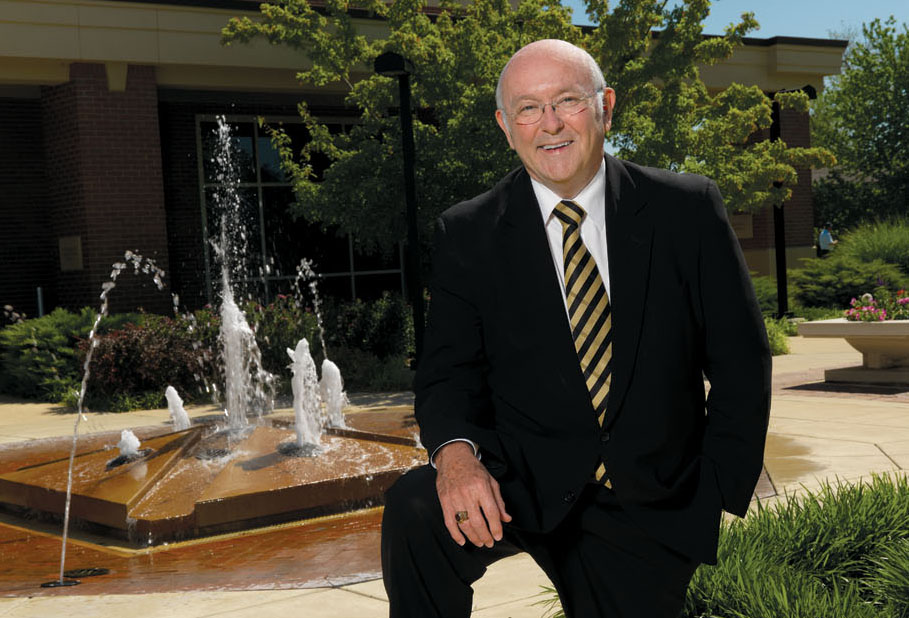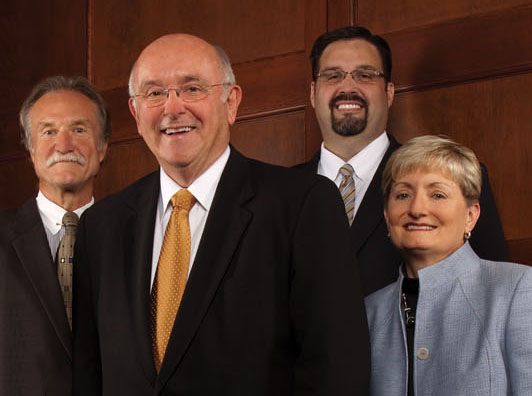
Timing isn't everything. Neither is place. No, when it comes to running a university, it mostly takes the right person — at the right time, in the right place. For the past 13 years, Don Beggs has been the right man.
Of course, Wichita State's 12th president, who took up the university's top post back in January 1999, immediately points out that it takes hundreds — to be precise, the current number of benefits-paid WSU employees is 1,857 — of smart, dedicated, skilled people to effectively man the varied operations of Wichita's 14th largest employer. Whether working in roles categorized as faculty or staff, whether teaching in the classroom, partnering in research with local industry leaders or maintaining campus buildings and grounds, every one of them, Beggs says, counts as "crucial" in the proper functioning of the university. They are just as crucial, he adds, as the president.
"In my opinion," says Ted Ayres, WSU vice president and general counsel, "one of Don's very best traits is his unassuming nature and lack of a perceptible ego. While I am confident it doesn't go unnoticed, I don't believe he gets enough credit for being a person equally comfortable with political leaders, government officials, industry CEOs, business tycoons, alumni, faculty, students and staff."
Elizabeth King, president and CEO of the WSU Foundation, adds that "humility" is a key trait of the president's. "Don is extremely uncomfortable with public praise and never wants to be placed in a position where he is exalted and the contributions of others are not recognized," she says. "He makes every effort to express his appreciation for all involved in the ongoing workings of our university."

administrators, from the left, Ted Ayres, vice
president and general counsel; Wade Robinson,
vice president of CLUR; and Mary Herrin '72/76,
vice president of administration and finance.
Mary Herrin '72/76, WSU vice president of administration and finance, reports, "President Beggs makes everyone feel welcome and at ease. He truly cares about each individual at this university and recognizes their respective contributions to our university mission."
Wade Robinson, vice president of Campus Life and University Relations, notes, "His genuine caring for people as individuals is his greatest contribution, and one often taken for granted."
And Pat Campbell, who serves as the president's executive administrative assistant, says simply, "He's the epitome of genuineness."
All the Stakeholders
Back in 1999 when Beggs, then 57, became Wichita State's president after serving two years as chancellor of Southern Illinois University in Carbondale, Nancy Belck, a former SIU-Edwardsville chancellor, described his administrative style much like Ayres, King, Herrin, Robinson, Campbell and others do today: "He takes a collaborative approach and partners well with faculty and staff and all the other stakeholders in a university."
Beggs himself likens working as a university president to "conducting an orchestra." And he adds with a chuckle that his wife, Shirley, might laugh at his musical choice of analogy, since he's never played an instrument. His own talents were proven in the scholarly field of educational assessment, measurement and statistics. As the senior author of a nationally standardized test developed using higher-order thinking skills to be an alternative to traditional intelligence tests, he earned a strong reputation as both scholar/researcher and teacher before he transitioned into higher education administration.
Despite his lack of musical performance experience, his president-as-conductor analogy is apt. He knows something Johann Sebastian Bach once famously explained this way: "It's easy to play any musical instrument: all you have to do is touch the right key at the right time and the instrument will play itself." For 13 years, Beggs has conducted the complex orchestra that is Wichita State largely by selecting, supporting, encouraging, cautioning or guiding the right university stakeholder at the right time — and stepping back to listen to the music.
He recalls that one former university president once told him, "On a good day, there are thousands of decisions being made on campus — and I didn't make any of them." The wisdom in that bit of humor stuck with Beggs, who adds an anecdote from his own administration. From time to time, he says, he would tell colleagues,
"If we agree, we both don't need to be here." During one particularly tense administrative meeting ("Meaning," he clarifies with a smile, "we weren't all agreeing."), he reminded them of that comment, adding, "but it's OK to agree sometimes." The tension evaporated.
"President Beggs has the unique ability to make faculty, staff, students, alumni and the community understand that WSU is a great treasure that contributes greatly to the lives of everyone in this region," Herrin says.
Keith Pickus, interim provost and professor of modern German and European history, adds, "Dr. Beggs and Shirley have been tireless advocates for students, faculty and the staff of WSU. In addition, they made great improvements in the relationship between the Wichita community and the campus."
Mark Parkinson '80, a former Kansas governor who is known, like Beggs, for the ability to get things done working with a diverse range of people, credits him with having "the rarest of gifts — he listens. He then takes what he learns, organizes into action and motivates his team to move forward."
Moving Wichita State forward has called on Beggs to conduct the university's passage through some tough times, perhaps none tougher or more discordant than the years after state funding cuts were necessitated by the global economic recession that began in 2007. A first wave of budget cuts crashed in on the six Kansas Board of Regents universities in the form of a 7 percent reduction in state general funding in fiscal year 2009. More cuts followed, eventually totaling a state-funding reduction of approximately 12 percent. Beggs responded by listening to a wide array of experts and then leading the university in reshaping its overall purpose, while leaving its fundamental mission intact. "Our bottom line," he says, "is learning."
Location, Location, Location
In 1999, he articulated his commitment to learning in these words: "I look at a university as a living organism. In doing that, I see us as constantly changing, constantly modifying and learning about ourselves and growing — growing in terms of our ability to provide new experiences in learning for both faculty and students. When faculty pursue research, they're learning. When students are pursuing a degree, they're learning. The rest of us, administrators and staff, have the responsibility of providing a supportive environment for that. We're all trying to create the best environment for learning — then all of us learn."
One of the many WSU "reshapers" whom he turned to for ideas was Gary Miller, former WSU provost and vice president of academic affairs and research. Miller, who left WSU in 2011 to become chancellor at the University of North Carolina at Wilmington, advocated for Wichita State to join some 40 other universities that define themselves as "urban serving."
Today, as the only urban serving university in Kansas, WSU has broadened its engagements with the wider community, most strikingly through work-based learning programs geared to better prepare students for jobs, as well as faculty and student research collaborations with local business and industry.
"President Beggs is a strategic thinker, and has always had the ability to see the big picture, yet understand the details necessary to address situations as they arise," Herrin notes.
Indeed, Beggs has proven his understanding of the educational lay of the land. Taking cues from his presidential predecessors, including Gene Hughes, who served from 1993 to 1998 and promoted WSU's "metropolitan advantage," Beggs has come to see WSU's greatest strength — excepting its people — as "location, location, location."
He says that well before they moved into the president's house on campus, he and Shirley had heard about and been impressed by Wichita's "entrepreneurial spirit." In large measure, it is this spirit of creative enterprise that he tapped into for stability and growth when state funding for higher education dipped precipitously.
"I believe President Beggs will be regarded for how he worked to connect the university with the community through the creation of such academic programs and centers as the Advanced Education in General Dentistry and the National Center of Innovation for Biomaterials in Orthopaedic Research," King says. "He's also supported the enhancement of the National Institute for Aviation Research and the Advanced Networking Research Institute, which includes the CISCO Technical Research Center. WSU's Cooperative Education and Work-Based Learning program has grown substantially during his administration — and has served more than 4,500 students in the past 13 years."
A champion of workable innovations of all kinds, Beggs also spearheaded WSU's acquisition of technology that streamlined the way the university handles information. An Enterprise Resource Product called Banner — software that provides 24/7 access to live data via the internet — integrated five data-rich areas: finance, students, financial aid, HR/payroll and alumni.
Tyler Heffron '02, a Wichita attorney who's serving as alumni association president, relates, "I think one of President Beggs' most meaningful contributions to WSU has been his steady guidance during a period of time that saw dramatic change in the sources and amounts of funding available to higher education. Most impressive given this change in the economic landscape, is that President Beggs has managed to grow and build WSU into an even stronger institution. This hard work of his has benefited the WSU community, Wichita and the state of Kansas."
And Beggs, despite the limiting fiscal environment, will leave a number of lasting physical changes on campus. "Koch Arena, the Marcus Welcome Center, the engineering research building, the AEGD building and the planned renovation of the Rhatigan Student Center — all these facilities will be a tangible reminder of his vision and leadership," Ayres says. "They will serve many future generations of Wichita State students, faculty, staff, alumni and visitors."
Like Clockwork
Notwithstanding his many administrative accomplishments, Beggs says his proudest career achievement is earning the rank of professor, a goal he reached at the age of 30. Although he talks about this with pride, it's obvious he'd rather be talking about the university or, even better, the people he and Shirley have come to know and respect — and the experiences they've shared.
He recounts as among his favorite memories the excitement of watching the men's basketball team win the NIT championship at Madison Square Garden in 2011 and later that year being back in NYC for a WSU Symphony Orchestra performance at Carnegie Hall. He enthusiastically recalls his pleasure and pride when three WSU-educated and world-renowned opera personalities — Sam Ramey '69, Alan Held '83 and Joyce DiDonato '92 — returned to Wichita to perform. And he says he'll miss walking on campus at dusk with Shirley.
"What Shirley and I will miss the most," he says, "are our relationships with people." He goes on to mention some dozen Shockers by name, Fran Jabara, Mickey '45 and the late Pete '42 Armstrong, Linwood Sexton '48 and Velma Wallace, among them.
"A generous heart expresses itself through kindness, a sense of thankfulness and an appreciation of others," Wallace says. "Don and Shirley have brought these qualities into our lives. We celebrate the good work they have done — accomplishments that no doubt will never fully be known."
Debbie Kennedy '94, alumni association executive director, notes, "Don and Shirley have kept the fullest schedules imaginable, and their energy levels never seem to fall. Whether they are representing Wichita State at formal functions or at casual athletics and alumni events, whether they are interacting with students or visiting dignitaries, they are everywhere, and at all times thoughtful, warm and gracious."
Perhaps it's because of that non-stop flow of scheduled activity that Beggs is so attentive to clocks — or it might just be the conductor in him. "He has this thing about all the clocks in his office being synchronized; he has several, you know," Campbell reports. "Occasionally he'll call me in to his office so we can get them all in sync. He seems to draw great satisfaction from this — like it's a super duper accomplishment. I've never teased him about this before now."
Shirley adds, "He's always on time to the point where we've driven around the block more than once to keep from getting to a party too early."
The Road Ahead — On CJ Time
Ayers says, "As a ‘Chevrolet man,' my dad claimed that Chevys were ‘dependable, efficient, low maintenance, cleaned up nice, kept their shine, did not overheat in sticky conditions and with minimal care, would run forever!' During the last days of Dr. Beggs' presidency, it occurs to me that he is WSU's very own, and very special, Chevrolet Impala."
Except that Beggs likes Jeeps better. "My first car was a Dodge we called the Blue Goose," he recalls, and Shirley adds, "Yes, I rode in the Blue Goose until he got a cute red and white Ford Fairlane. He has had five Jeeps!"
As their time on campus ticks down and they prepare to move into their new home in Illinois, Beggs says that, although their years as Wichita State's first couple will forever be remembered and in their hearts, he's tiring of the reminiscing, of looking to the past. "Shirley and I," he says, "have always looked forward." And what he's anticipating with particular pleasure is no work-related schedule. "We like to take drives and find what's unique or odd about new places," Beggs says. He pauses and adds: "But we'll still be on a schedule — CJ, our cat, we'll be on CJ time."
Happy (relatively clock-free) travels!
 John Bardo Named WSU's 13th President
John Bardo Named WSU's 13th President
"I want to thank the Kansas Board of Regents and the members of the WSU community for the opportunity to continue building on the strong traditions of high quality education, engaged scholarship and public service that have been the hallmarks of WSU for generations," John Bardo said after being introduced as the next president of Wichita State during a news conference on campus April 27. "I can't think of any place I'd rather be than right here, right now."
Bardo, former chancellor of Western Carolina University in Cullowhee, N.C., earned a bachelor's degree in economics from the University of Cincinnati, a master's degree from Ohio University in sociology and a doctorate from Ohio State, also in sociology. Over the course of his career in higher education, he has served as department chair, dean, vice president and provost.
As a scholar and sociologist, he has researched globalization, technology and the relationships between higher education and the economy. He began his career at Wichita State. From 1976-1977 he was graduate coordinator of the Master of Urban Studies program, and from 1978-1983, he was chair of WSU's department of sociology and social work.
His wife, Deborah '75/77, is a Wichita State graduate who earned a bachelor's degree in secondary education and a master's degree in communication.






